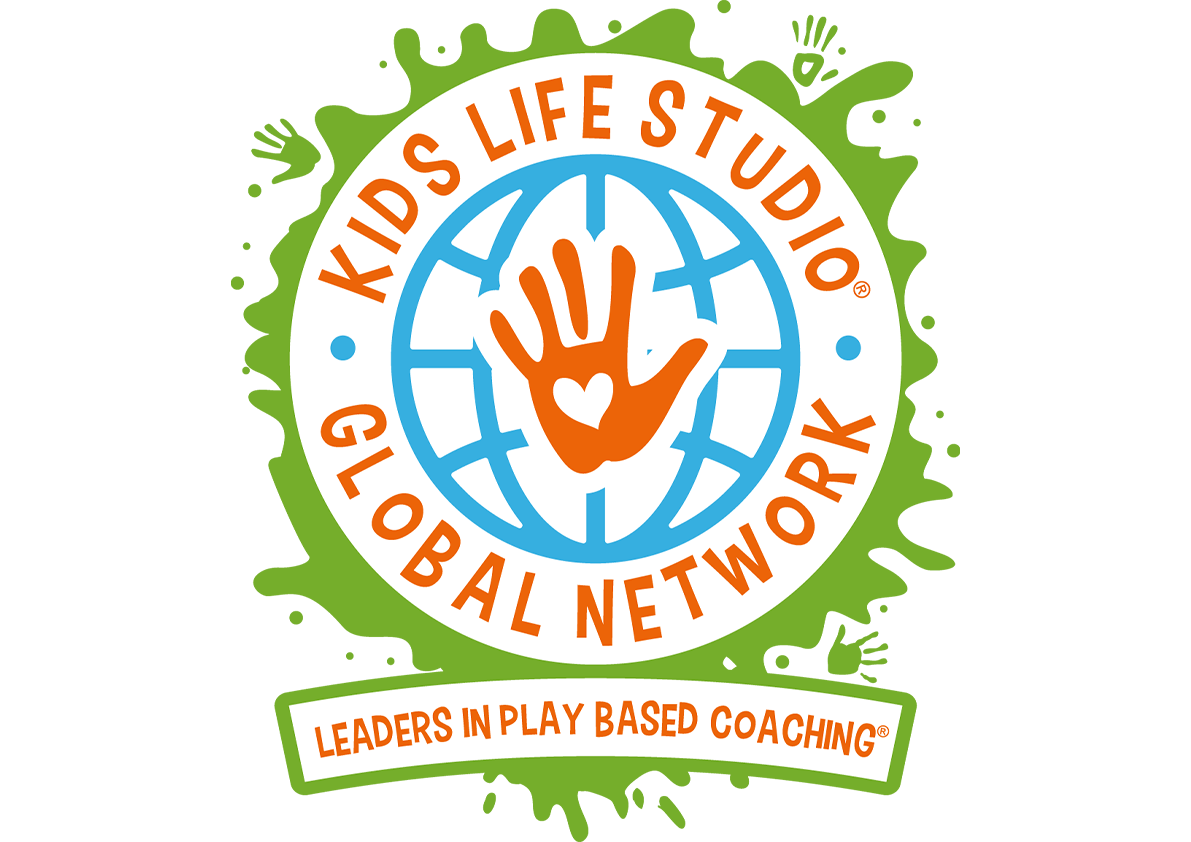FREE Coaching Resources!!
Check out our free resources for families and coaches.
Visit our Coaching Resources page each month for new resources and fun activities.

No arms to hug, no eyes to see
Diversity, equality and inclusion are new buzz words but what do they actually mean? Understanding the fundamentals of how to support children with special needs, learning differences, and diverse backgrounds are important in a world where the “new normal” is to “not fit in but to stand out.”
Build Up Challenge Poster
Do the Build Up Challenge for better mental health, self improvement and self awareness.
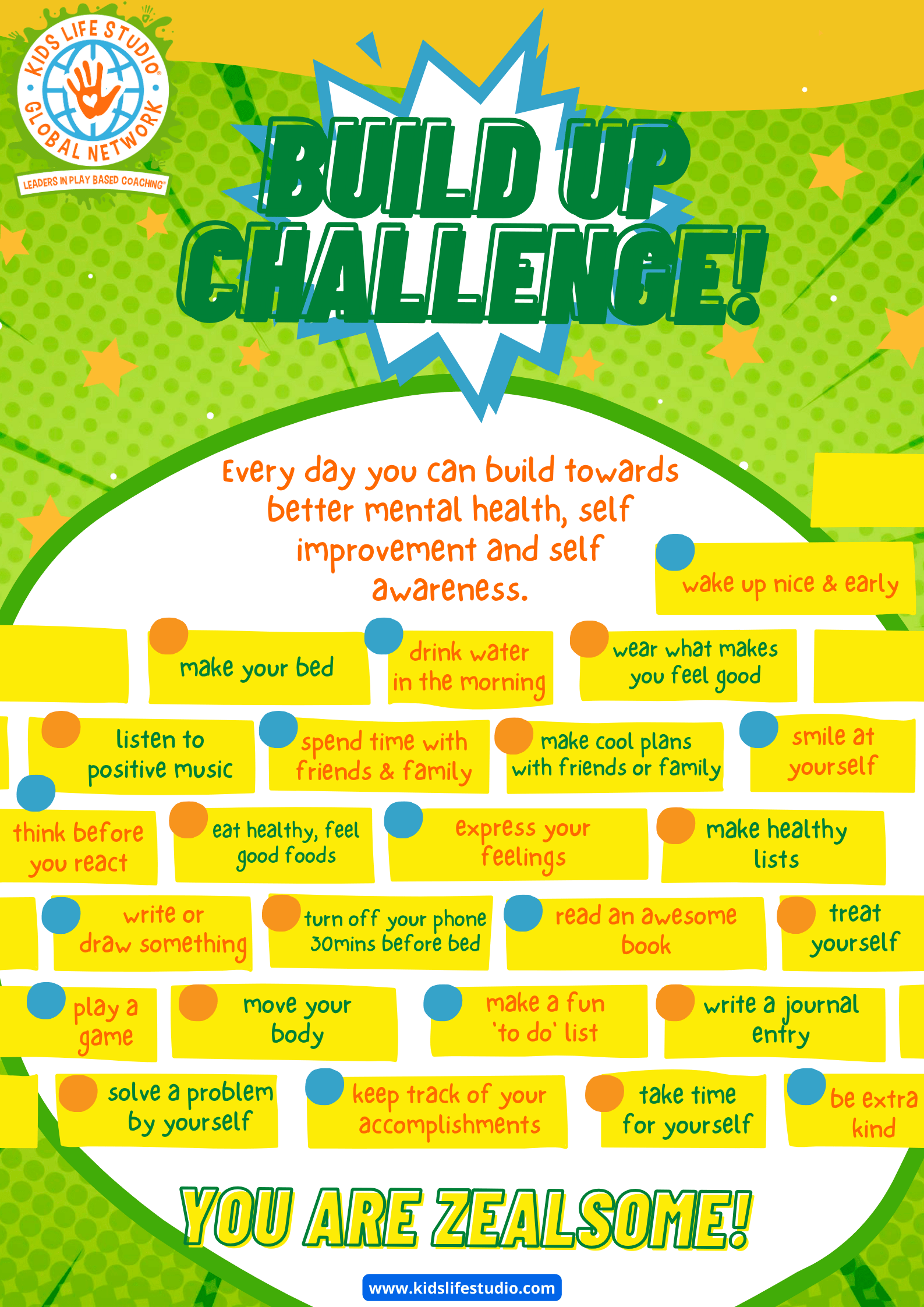
BUILD-AN-ADULT
One of the most rewarding aspects of parenting is seeing your adult children successful and happy. And while it would be great if this were to just magically happen, it can’t. It takes years to develop – after all, the prefrontal cortex (the intelligence, rational, time management, and flexible parts of the brain) isn’t fully formed until we’re about 25 – 30 years old! So, in order for your child to develop self-esteem, self-awareness and leadership skills, you must guide them throughout the time they’re under your wings, making sure that whatever you instil is appropriate for their developmental stage. Chores are actually GOOD for kids, as long as their age-appropriate AND your expectations are appropriate for their developmental stage.
Another suggestion – Just like an employee of the month bulletin board, a celebration space in your home is your opportunity to celebrate your child’s wins! This space should be selected and decorated with the entire family’s input. It can be as simple as a spot where you stick Post-It notes detailing the wins or as fancy as a shadow box complete with an easy-access door for each family member. When you put something into your space, be sure to detail the effort used, and not just the outcome – i.e. “Jonny used his math test mistakes to see what he needs to work on understanding more in math”. Perhaps print out our Printables and display them in this area so easy to see and access and practice!! Each child can have their own Build Up Challenge to tick off as they smash each suggestion box.





Theme Links
Andrew Solomon: Love, no matter what | TED Talk
How to improve your child’s self-awareness – Healthy Mummy Wellness
9 books for children that champion neurodiversity | National Book Tokens
Book recommendation OUT OF MY MIND by Sharon M. Draper – fiction story about an elementary aged girl with cerebral palsy. Teaches perspective, resilience, compassion.
What kids want that money can’t buy
Parental involvement is sometimes substituted for material possessions in a world geared towards commercialism. A variety of reasons could be the cause of this such as parents overcompensating for their lost childhood, or a lack of time and energy. The aim is to discuss ways to effectively engage and spend time playing with children to build a solid sense of self based on a values system that becomes an inner GPS for making choices.
Connection Time Poster
Use this chart to set daily goals for a balanced lifestyle.
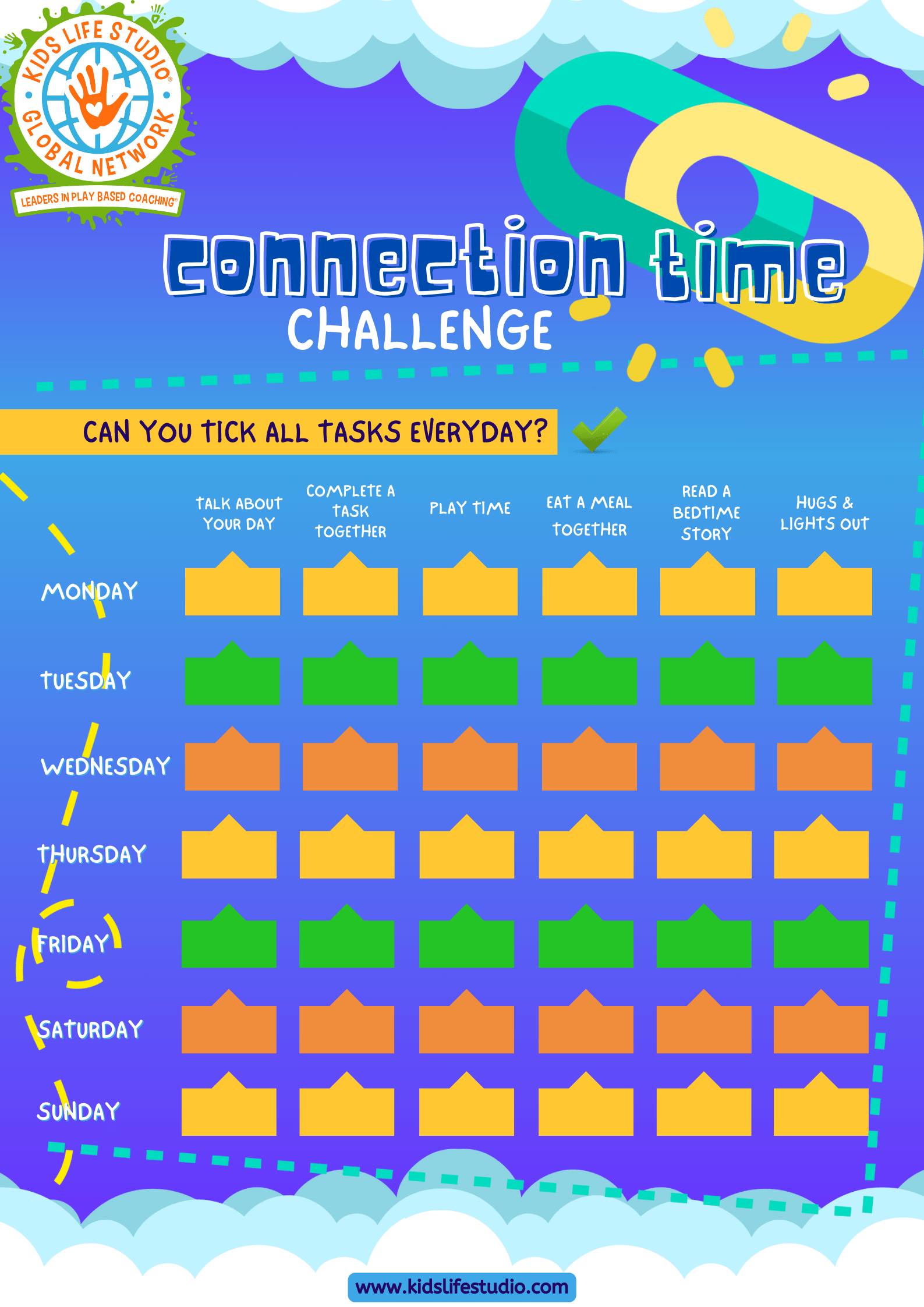
CONNECT THE DOTS
Connection can be seen in many ways. Paying attention, being present, enjoying each other’s company, openness, curiosity, listening, laughing.
Connection is the main reason children feel inclined to listen to parents!
Children who feel strongly connected to their parents want to cooperate.
Connection lowers anxiety, boosts immune system, regulates moods.
Connection is easy when you are 100% present. Schedule connection time with your kids like you schedule an errand or meeting.
Connection Ideas:
- Read a book
- Go for a walk
- Dance for one song
- Play a board game or card game
- Cook or bake something
- Play a sport
- Share a story
- Laugh over a joke
- Hug, Hug, Hug
- Ask a question
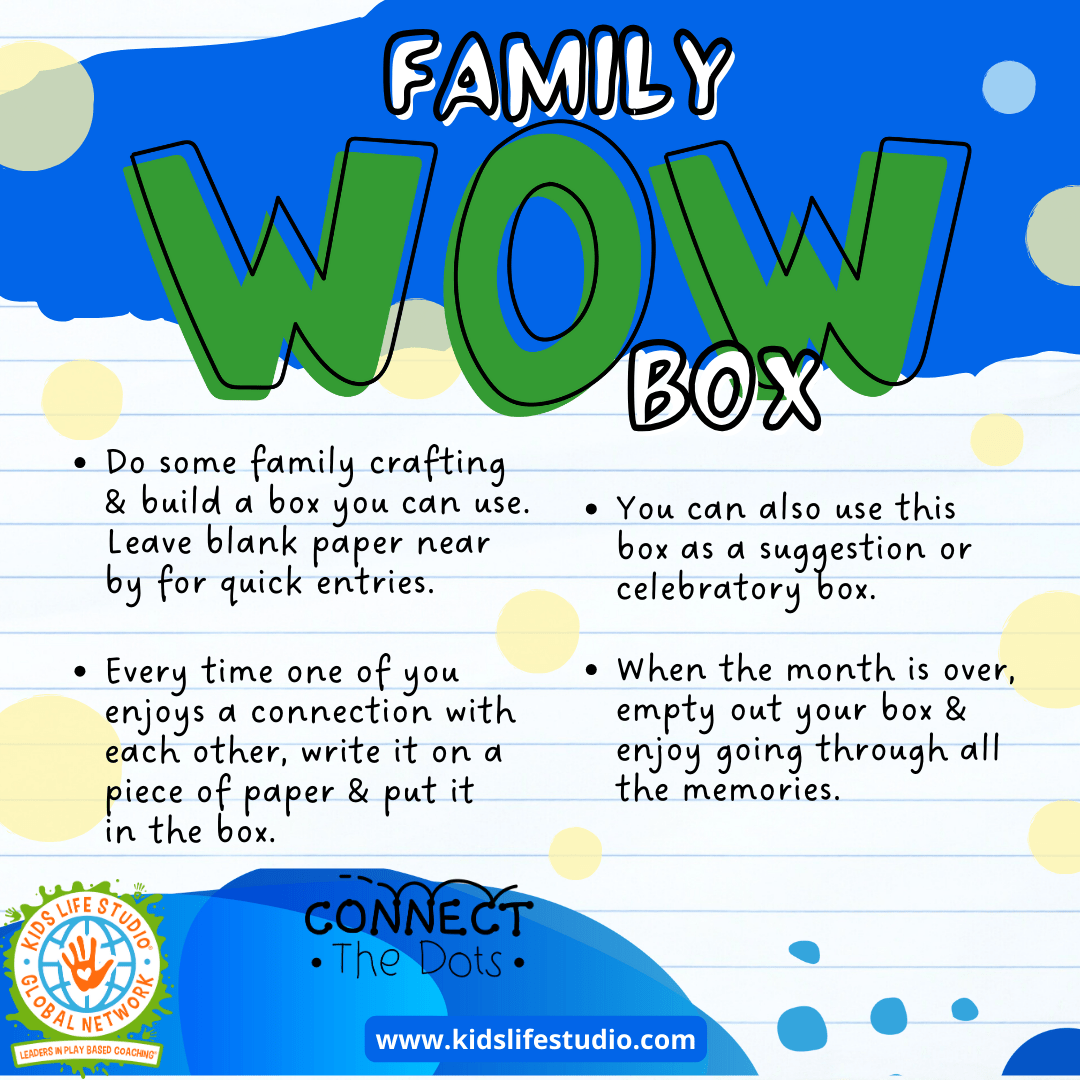
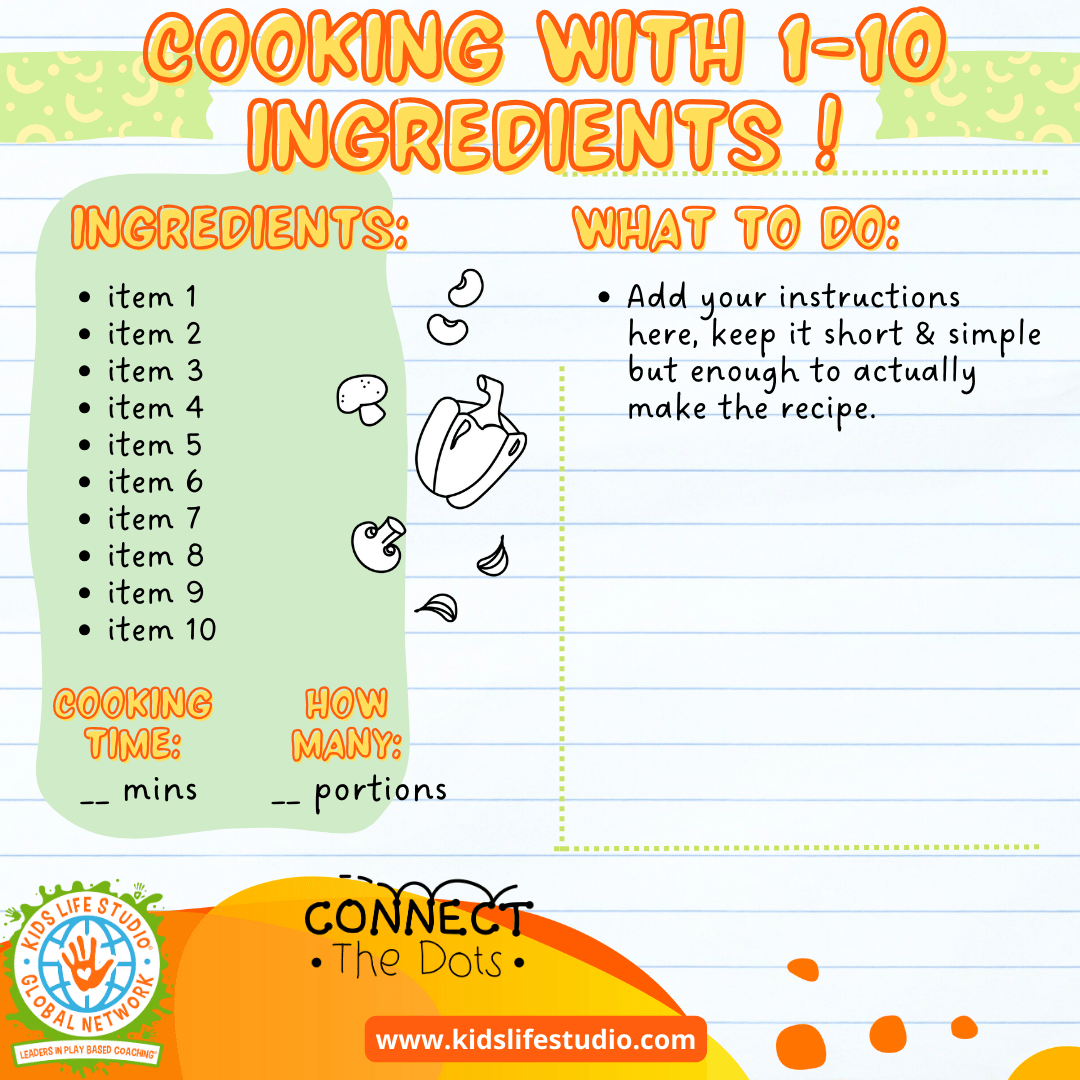
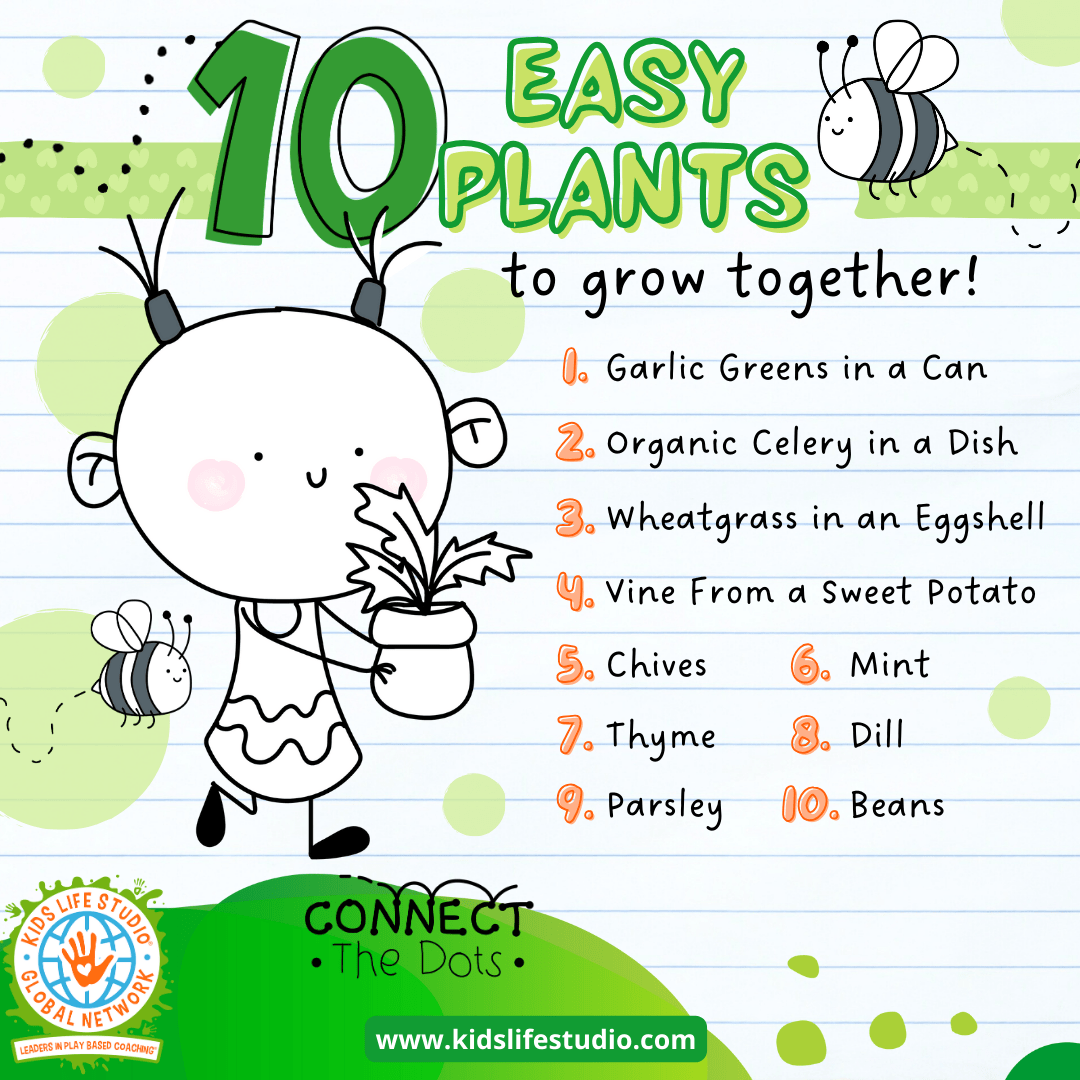
Theme Links
Communicating big feelings
Exploring and deepening communication skills is something that every family benefits from. The art of effective questioning, active listening, and conflict management strategies allows the opportunity to make good choices when big feelings arise. All feelings are acceptable, but it is only a viable solution to a challenge when big feelings are channelled correctly and opportunity is given for healthy expression.
Stay Balanced and Happy Poster
Use this chart to set daily goals for a balanced lifestyle.
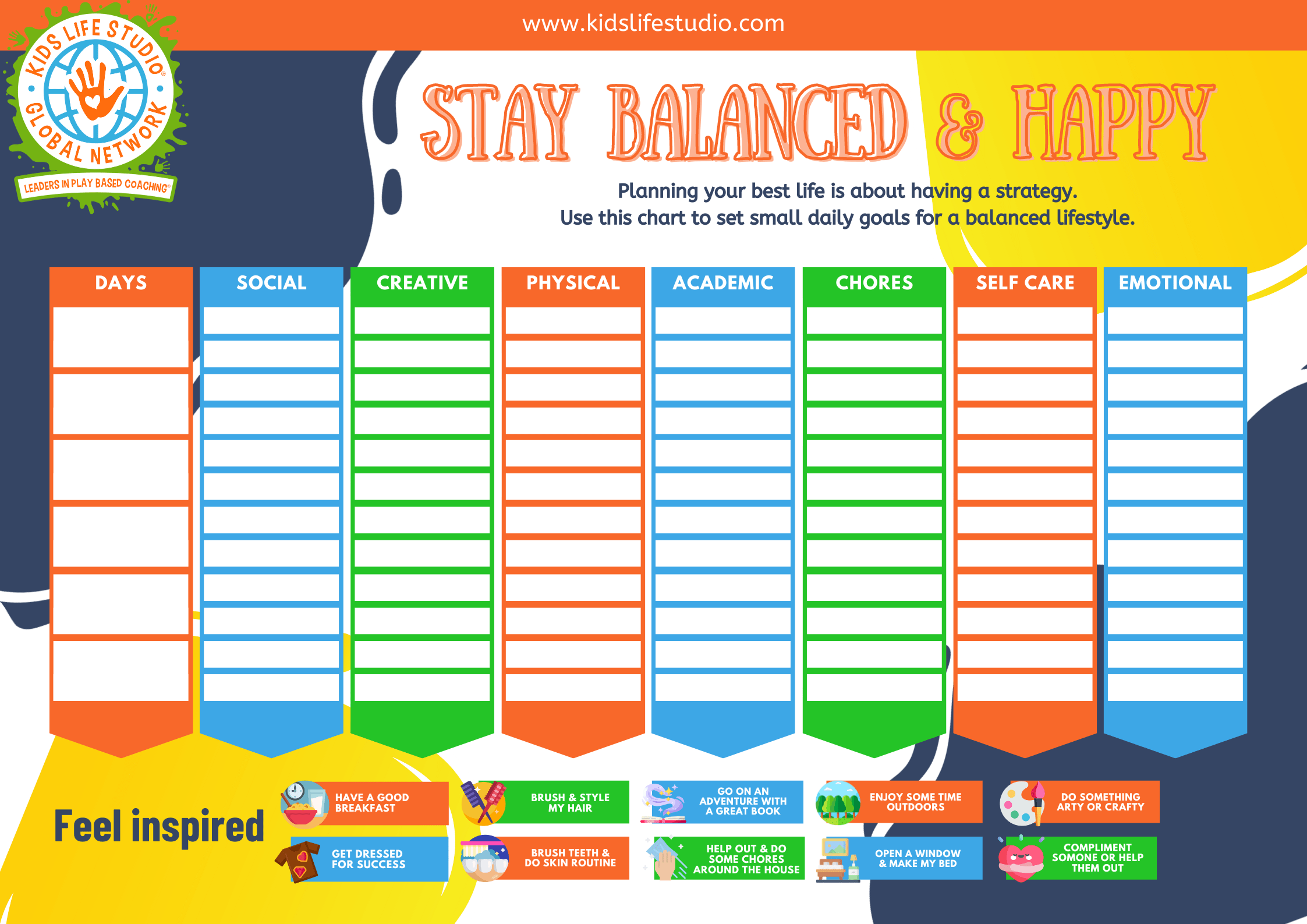
COMMUNICATION FUN-TIME
Build family connection using the posters below which give some ideas of what to do together when you need time to bond and communicate as a family. Have a craft day to create ice-cream stick cutouts and each family member gets to take turns to choose the activity they would most like to do.
Designer Toastie Night
With a selection of breads, spreads, meats, veggies, and other ingredients, gather in the kitchen and see who can make the best looking, smelling and tasting designer toastie. The ingredients can be simple, and you can do this for any meal time.
Indoor Camping
• a tent
• something comfy to sleep on
• flashlights
• fun activities to keep you busy
• and s’mores
• grab a flashlight and do some fun shadow activities.
• tell some fun stories.
• sing some songs you know.
• play some traditional games
Have A Gratitude Jar
Choose a theme that makes saying thanks fun! It’s a great gift for yourself, family and friends that helps reinforce the value of gratitude and appreciation. Set a gratitude jar on a table, pick a card, say thanks, and feel the good vibes increase your mood and happiness!
Movie Theme Night
• Pick a movie and make it your theme!
• Everyone must try to dress up as a character
• Decorate your movie space to match the theme
• Prepare food that is inspired by the movie
• Make silly rules for catch phrases or certain words said in the movie
• Play musical chairs during scenes where music is playing, & there’s no talking
Family Fitness Day
• Choose a few different fitness things to do, like working out at home, hiking, running, biking, walking, yoga, swimming to alternate
• Stay away from fixating on things like weight, calorie counting & diets
• Concentrate on healthy living
• Plan family fitness challenges to motivate each other
Family Dinner at the Table
• A perfect time to put those phones away share stories & feelings about your day
• Bring up things that are bothering you.
• Try out new recipes & cook together
• Make teams & see which team can cook the best dinner
• Everyone gets a turn to have their favourite meal be dinner on their chosen night
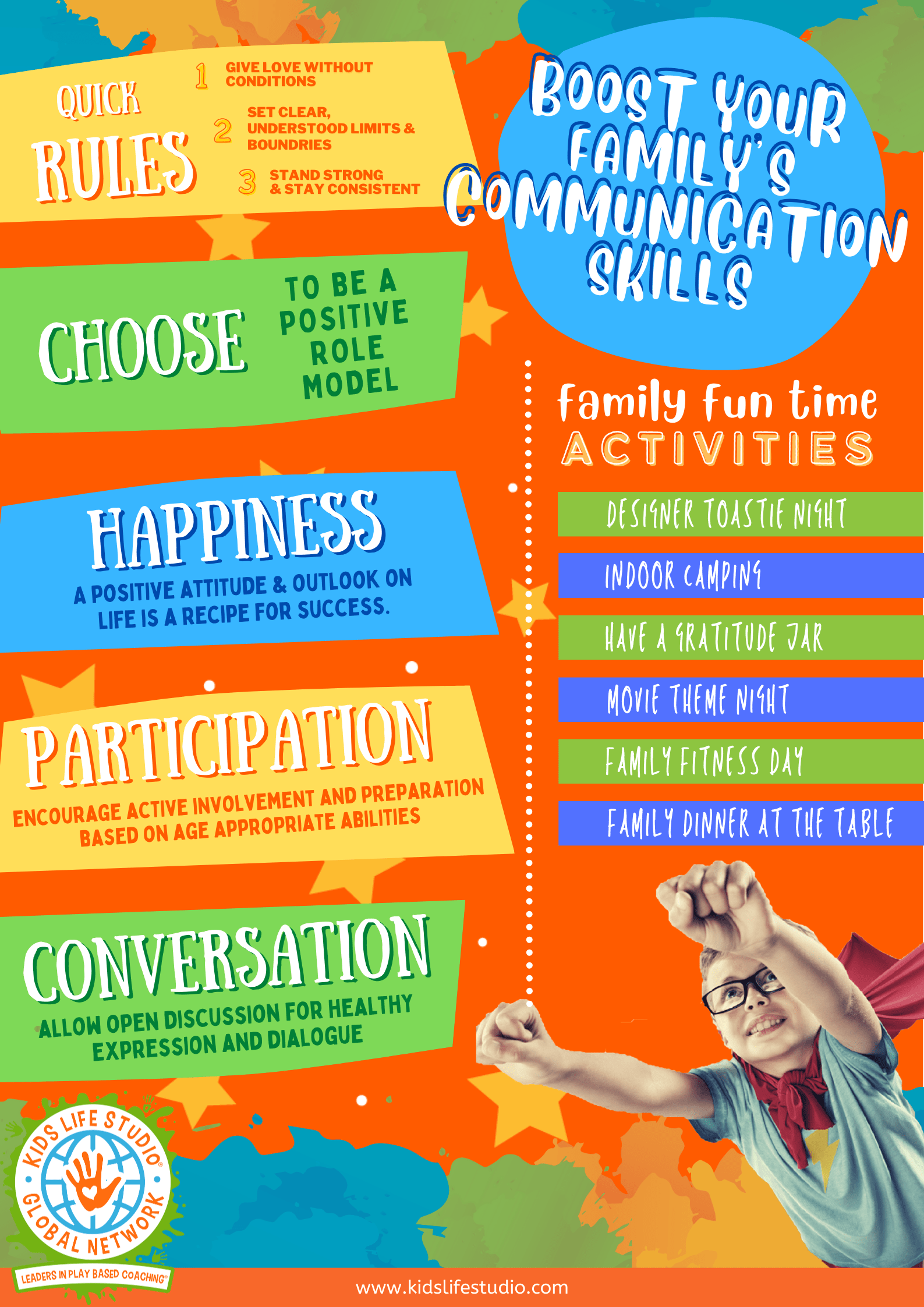
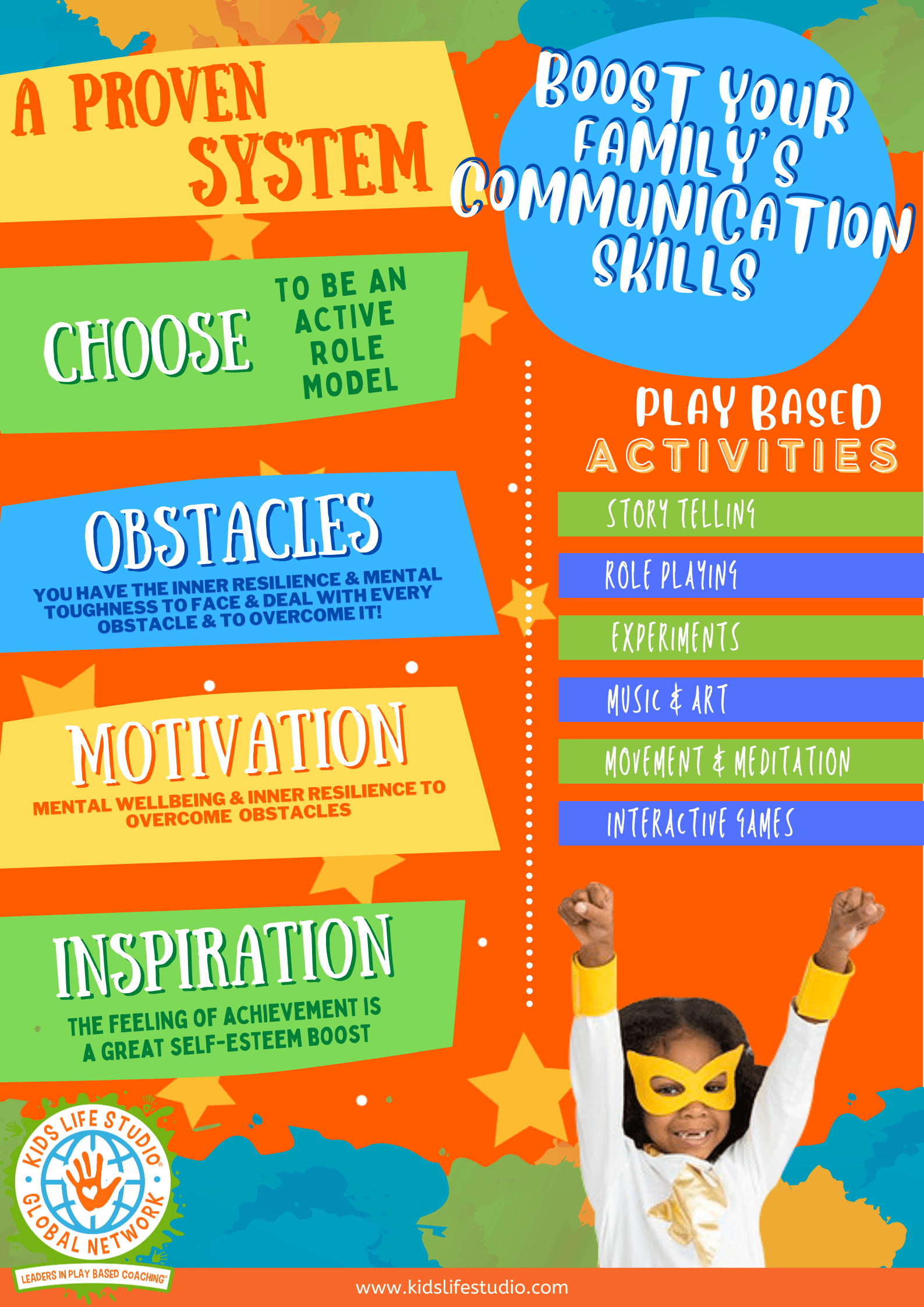
Theme Links
Being nice doesn’t matter
Building Emotional intelligence is not about learning to be nice, it is about playing your top inner game. Supporting children to develop self awareness, regulation, empathy, and social skills is an essential part of this puzzle, but there is more to it that nobody is talking about. Secret whispered out loud may be the solution?
Click here to view Zelna Lauwrens, our founder, speaking on why Being Nice Doesn’t matter
Acts of Compassion Challenge Poster
Use this fun poster to complete small acts of compassion each day. Before you know it, you will be doing them without thinking.
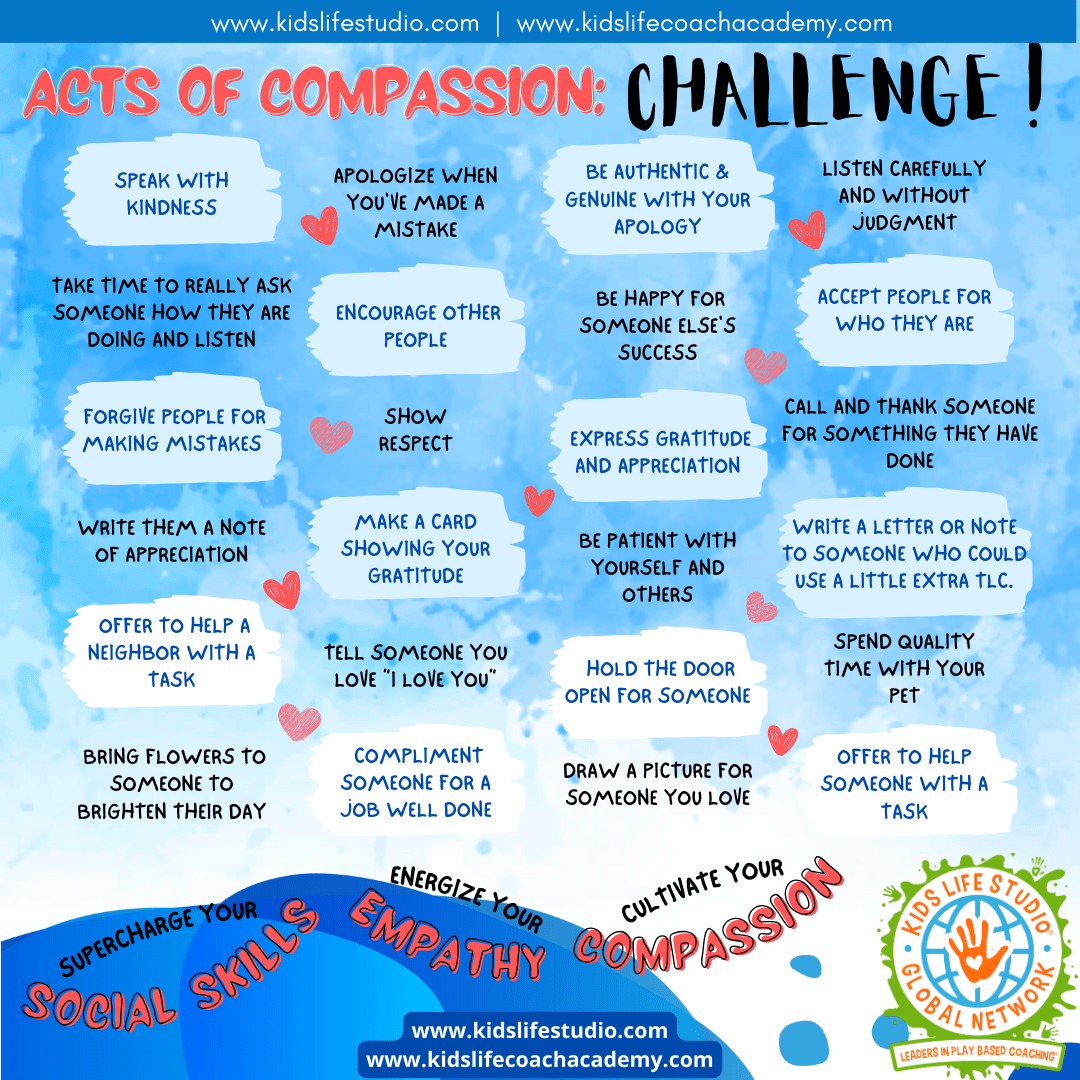
WHEEL & TRACKER
Build emotional intelligence & emotional vocabulary with our easy to use printables. Create a daily emotion tracker from our sample provided to gain insight into your moods and triggers. Make a game of understanding emotions, learn from it. Make it fun!!
Compassion FAQs
How do you know if you are compassionate?
✓ You feel connected to people, even if you are different
✓ Understanding what people are going through & feeling their pain
✓ Being mindful of other’s experiences, thoughts & emotions
✓ Taking action and helping someone when you notice them struggling
✓ High EQ (emotional intelligence) and being able to understand, manage and act on emotions of others & yourself
✓ Feeling grateful when others are compassionate towards you
Types of Compassion:
✓ Compassion for others: feeling compelled to take action to make a situation better for others
✓ Self- Compassion: treating yourself with love and kindness
Compassion Ripple Effect:
✓ Giving feels good & is rewarding.
✓ Compassionate people live longer
✓ Compassion contributes to life purpose & meaning
✓ People who volunteer experience reduced depression, improved immunity, and less inflammation
✓ Compassion improves relationships
How to cultivate compassion?
✓ Awareness & Attention: practice putting yourself in someone else’s shoes
✓ Let go of judgement: accept yourself and others for who they are
✓ Practice Mindfulness: focus on the present & become aware of your thoughts without judgement
✓ Practice Loving-Kindness Meditation: this improves your connection with yourself and others
Acts of Compassion:
✓ Speak with kindness
✓ Apologize when you’ve made a mistake
✓ Be authentic & genuine with your apology
✓ Listen carefully and without judgment
✓ Take time to really ask someone how they are doing and listen
✓ Encourage other people
✓ Offer to help someone with a task
✓ Be happy for someone else’s success
✓ Accept people for who they are
✓ Forgive people for making mistakes
✓ Show respect
✓ Express gratitude and appreciation
✓ Call and thank someone for something they have done
✓ Write them a note of appreciation
✓ Make a card showing your gratitude
✓ Be patient with yourself and others
✓ Write a letter or note to someone who could use a little extra TLC.
✓ Offer to help a neighbor with a task
✓ Tell someone you love “I love you”
✓ Hold the door open for someone
✓ Spend quality time with your pet
✓ Bring flowers to someone to brighten their day
✓ Compliment someone for a job well done
✓ Draw a picture for someone you love
Social Skills Activities
Encourage your child to try something different. Here is a list of activities, try to do a new one each week.
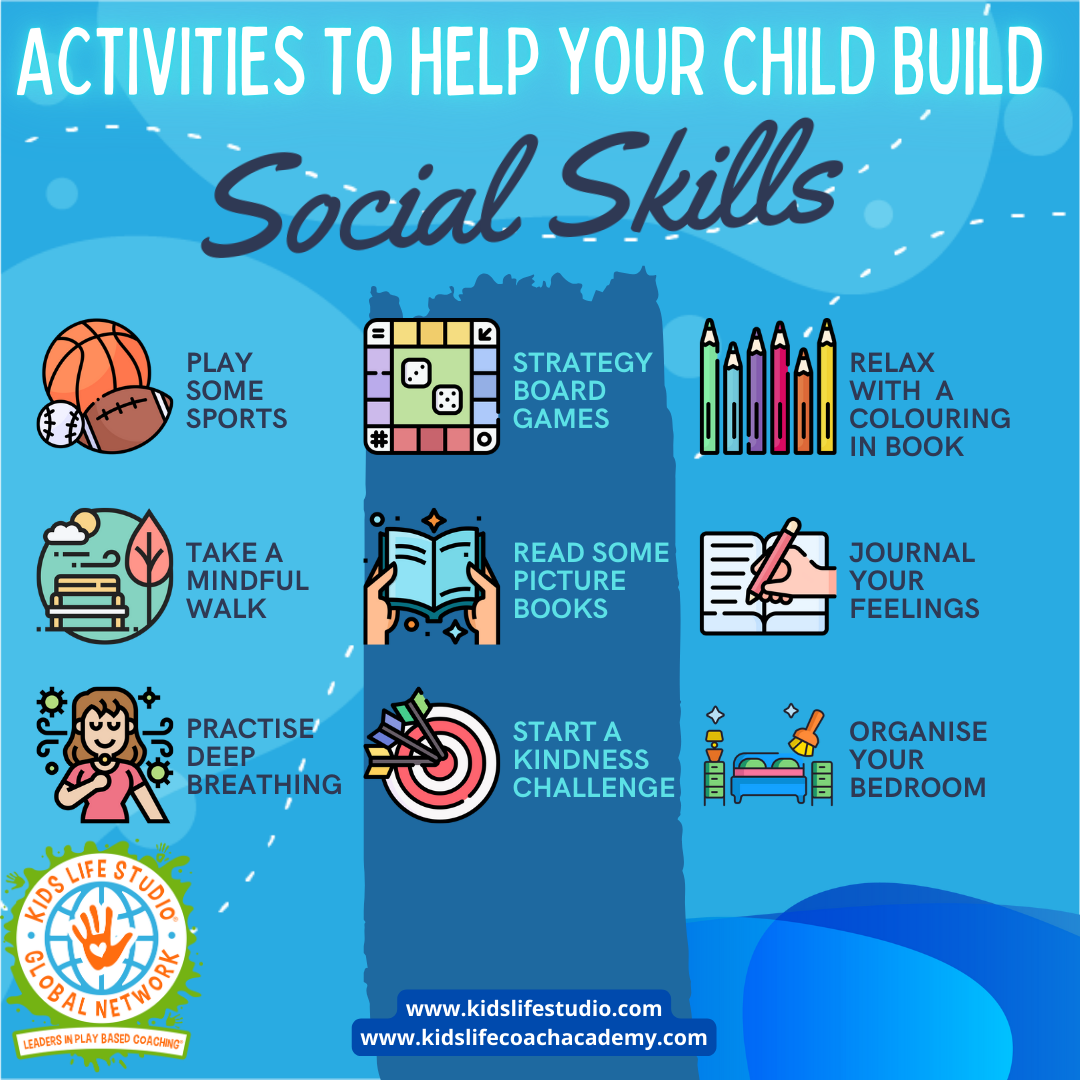
Theme Links
Stress Busters
Mindfulness and relaxation techniques are a great way to ground a child and offer an opportunity to connect to their inner self. Teaching children techniques to manage stress, improve focus, and enhance overall well-being allows them to make better choices for themselves and show up as their own best version.
Stress Less Poster
Use this fun poster to complete small challenges each day. Stress less and stay positive.
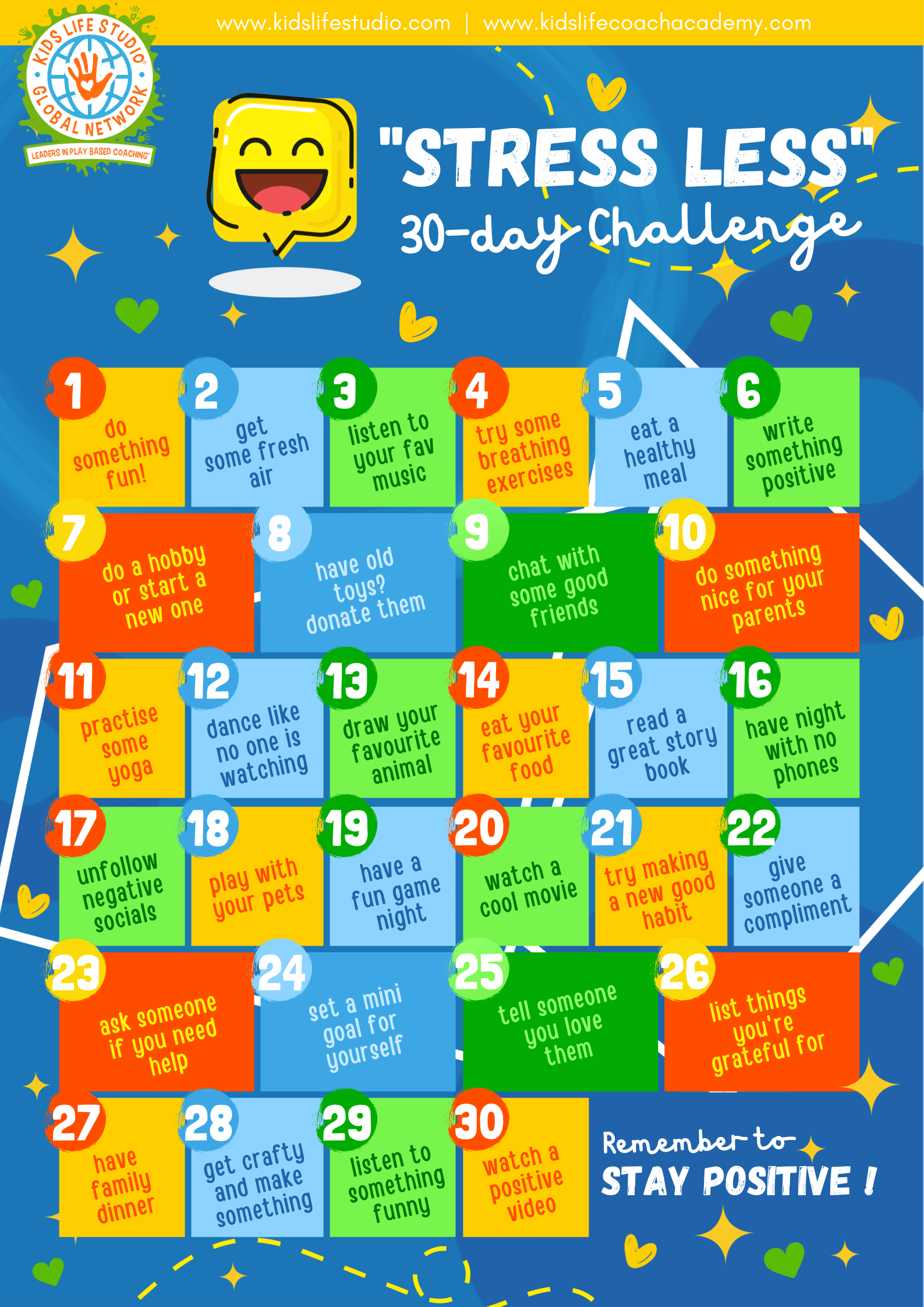
Yoga Poses
You can also use the ideas and resources provided by the Harvard Medical School for ongoing support. Their report says that:
“Yoga and mindfulness have been shown to improve both physical and mental health in school-age children (ages 6 to 12). Yoga improves balance, strength, endurance, and aerobic capacity in children. Yoga and mindfulness offer psychological benefits for children as well. A growing body of research has already shown that yoga can improve focus, memory, self-esteem, academic performance, and classroom behavior, and can even reduce anxiety and stress in children.”
Theme Links
The Trampoline Effect
Building resilience and grit is sometimes over emphasised in a world that seems to be flooded with toxic influences. Equipping children with the skills to bounce back from setbacks, persevere through challenges, and develop a growth mindset is only part of the solution.
New Year Choice Challenge Poster
Use this New Year Choice Challenge poster to participate in 31 simple daily challenges during the month of January to uplift your and somebody else’s life. Developing a heathy and positive mindset is a daily commitment, achieved one step at a time.
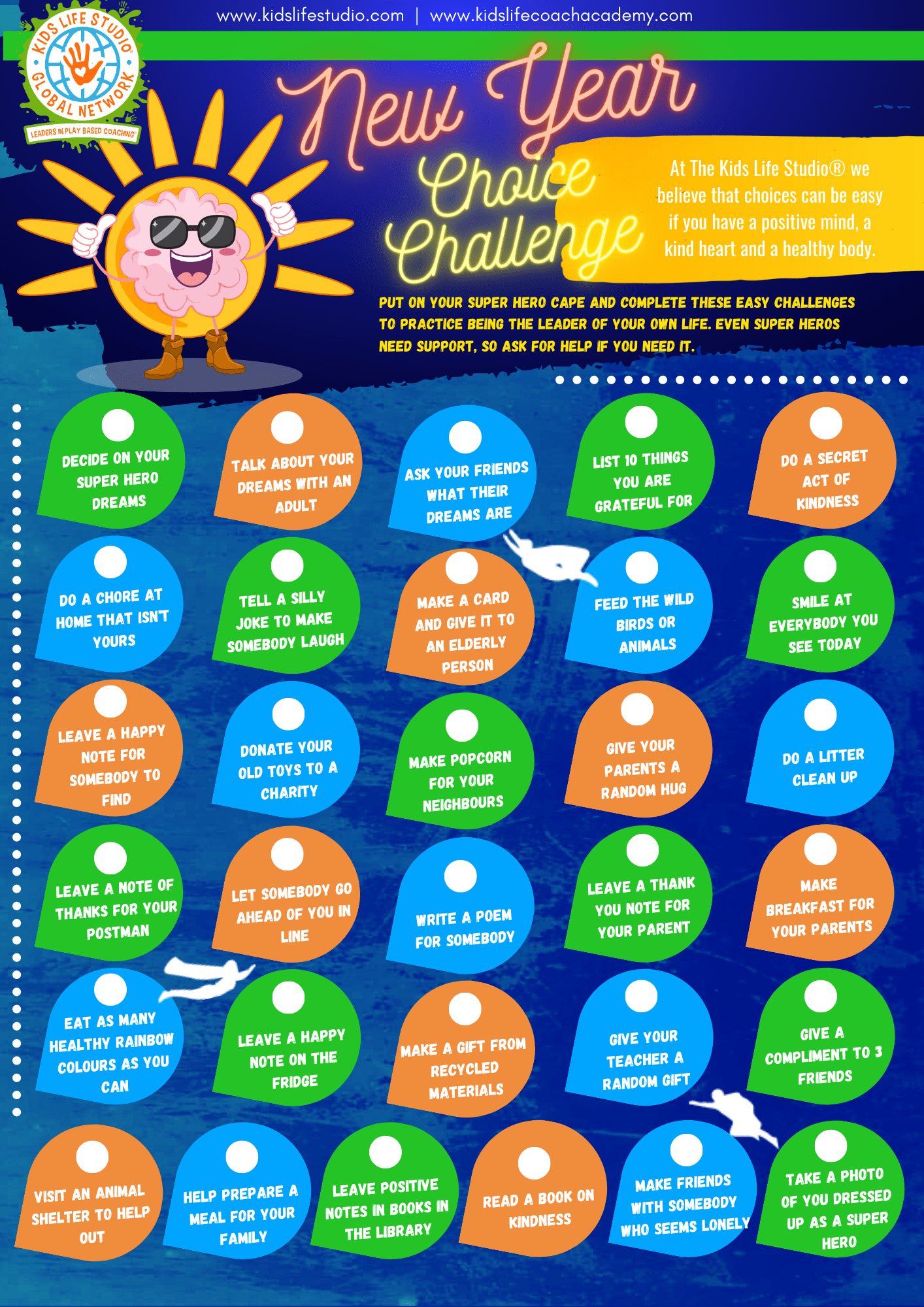
Resilience Fortune Teller
Use our ready to play Resilience Fortune Teller or create a bespoke fortune teller with your child, relating specifically to what they have overcome and achieved, or you can create and provide a ready made version that allows your child to acknowledge their growth.
The aim is to facilitate discussion with this useful tool that promotes resilience as a positive by-product of struggle. You can ask your child what they think resilience is and their answers may be one of the below that you can then use to further discuss the concept:
Resilience can be described as:
- Bouncing back after difficult times
- Dealing with challenges and still holding your head up
- Giving things a go or trying your best
- Being strong on the inside
- Being able to cope with what life throws at you and shrug it off
- Standing up for yourself
- Getting back into shape after you have been bent or stretched
You can also discuss some things that help to develop resilience such as:
- Having a positive attitude
- Finding good friends
- Feeling good about yourself
- Feeling like you belong
- Having a supportive family
- Helping others or ‘giving back’
- Being able to solve problems and overcome challenges
- Good communication with the people around you
The questions below are particularly good ‘conversation starters’ to get your child self aware of their own resilient attitude:
- What are your needs right now?
- What goals have you already achieved?
- What are your limits?
- What is really important to you?
- What annoys you?
- What makes you happy?
- What are your strengths that have helped you overcome challenges?
- How did you cope in the past?
- How do you usually deal with stress?
- Is there anything you would like to change?
